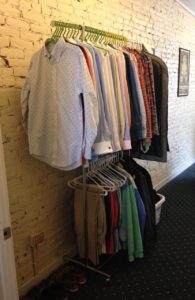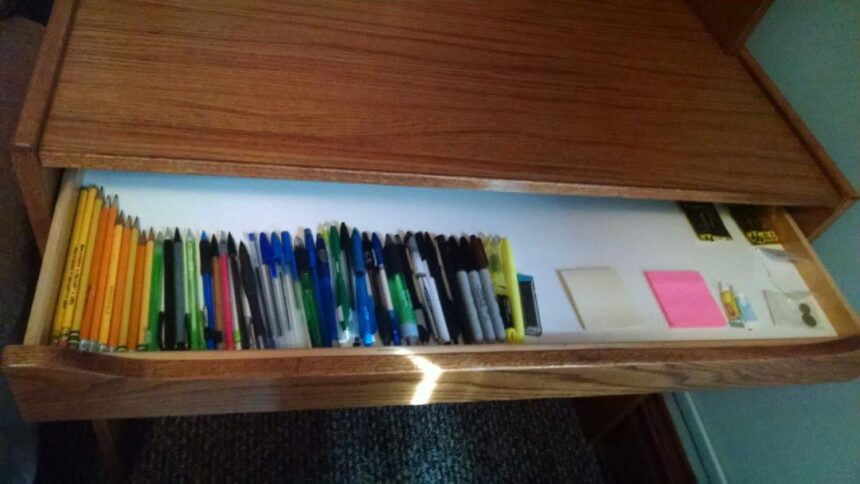
On laundry day, senior Meg Prom dumps a load of clean laundry onto her well- made bed and puts on a podcast. She sorts through the items, starting with pants and sweatshirts and moving to shirts and delicates, and then folds them vertically — something she learned from Marie Kondo, a professional cleaning consultant and author of “The Life-Changing Magic of Tidying Up.”
Kondo’s first book was a best-seller in Japan and Germany and became popular in the United States when in was published in English in 2014. Her newest book, “Spark Joy: An Illustrated Master Class on the Art of Organizing and Cleaning Up,” was just released in January, and Prom is one Hillsdale student who has been inspired by Kondo’s self-named “KonMari” tidying method.
“I sing the praises of it,” Prom said. She added that it’s more than just cleaning your room.
Prom first read about Kondo’s book online, and finally decided to purchase the book.
“Immediately I was struck by the fact that she was going off of a natural instinct to clean things and be organized,” Prom said.
Prom said her room used to look clean, but everything in her drawers would be crammed and messy, and she didn’t like that.
“I like things to be well organized, but I’m not a perfectionist — just neat,” Prom said. In preparation for graduation, this book has helped her clean out and get rid of what she doesn’t need. Kondo suggests going through all your things by types (clothing, papers, books, etc.) at one time, rather than step by step.
“I’m a one-trip kind of gal,” Prom said. “I like the whole idea. Get it done. No excuses.”
Prom said college students are lucky in that they don’t have houses yet: all of their makeup, clothes, and papers are in one place and available to you. She started with her clothes and lost nearly 30 pieces of clothing, which she sold to the online consignment store, thredUP. She now has only 20 hangers.
“The whole point is to have a cleaner mentality and having a better life,” Prom said. “The book inspired me to look at my new clothing in a new light.”
KEEPING A PEACEFUL ORDER
Prom said Kondo suggests thanking your clothing for “bearing your load” all day, and folding clothes vertically so you can see all your clothing at once.
“It’s so practical, which I love,” Prom said. “And it’s visually pleasing. Everything has a spot where it belongs. It’s a very pleasurable process.”
Prom also cleaned out her papers, but isn’t finished with the entire KonMari Method yet.
“Overall I would say that my room feels more peaceful because when I look into my closet it’s all perfectly orderly,” Prom said. “Everything just fits together.”
Prom might have found a great system for staying organized, but she’s not the only Hillsdale student who loves a clean room.
Junior Chuck Ahee has never heard of KonMari, but said organization is essential to his success in school.
“I feel more of a peace of mind,” Ahee said. “My dad always said that when you have to go outside of your own home to find sanctuary, that’s not a good thing.”
Ahee said right now his bedroom is his sanctuary and he is always excited to come home, light a candle and relax.
Right now, Ahee lives in an off-campus house with his own room and housemates respectful of his clean lifestyle. They had friends over recently, and the next morning Ahee and his housemates woke up and were mopping, washing dishes, and vacuuming up the mess from the night before.
In his room, Ahee said everything he owns has to have a home and everything has to be in its home. His drawers of pens has earned him the title “serial killer clean” from his housemates because he keeps all his pens and pencils in a row by size and type: Tall pencils, shorter ones, mechanical pencils, black pens, blue pens, and Sharpies.
Ahee said his clean room elicits shock from acquaintances — particularly women. “How it’s received is directly correlated to how organized the girl is,” Ahee said, with a laugh.
One of his biggest cleaning pet peeves is people’s messy cars.
“It’s a mode of transportation, not a storage facility,” Ahee said.
His other pet peeve is dirty dishes in the sink.
“If you don’t have time to clean your dishes, don’t have time to cook,” Ahee said.
He added that he loves things to be clean through and through – if his bed is made, but his sheets aren’t washed, that’s not acceptable.
“I’d rather something be actually clean than look clean,” Ahee said. “It’s more en- joyable to be in a room when it’s clean.”
Yet his organization extends further than his bedroom: As a biochemistry and economics double major, Ahee has a very systematic way of studying. First, he reads the chapter during the lecture period, and then three to five days before the test he make a study guide. He will then review the study guide and find a classroom where he can rewrite the guide onto the whiteboards. Finally, he will discuss the information with other people and quiz each other. Similarly, junior Paul Mittermeier said some people would say he suffers from undiagnosed OCD.
“For better or for worse, I try to maintain organized habits,” Mittermeier said.
Like Prom and Ahee, he lives in an off- campus house with his own, organized bedroom. His always-made bed sits up against a cream-colored brick wall. His Apple laptop sits on a spotless black desk featuring a tiny succulent plant, photos of friends and family, and books including the Bible and Atlas Shrugged. Mittermeier tries to always equip and prepare himself for whatever he will need to do during the course of a day.
For example, Mittermeier organizes all of his books by category and by subject, and then by author within those first sections. He has a record collection of more than 500 albums, which he has alphabetized first by genre, then by artist, and then by title within the artist subcategory. He also has a digital copy of all his records and a data- base where he can find if he already owns a certain record when out shopping.
Because he doesn’t have a closet, Mittermeier’s clothing is arranged by type and then by color within the type. On the rack you’ll find polos, oxfords, ginghams and seersuckers, pull overs, and then quarter zips. His shirt drawer contains all his T- shirts, subcategorized by short-sleeved, long-sleeved, shirts that he wears to bed, works out in, ones for class and nicer ones. Even though Prom uses KonMari’s vertical folding, Mittermeier prefers standard folding. He also suggested hanging dress pants to maximize the creases and prevent unnecessary ironing.
“You never know what the course of a day holds and when you need to find something quickly,” Mittermeier said.
He said he has always been organized, but the stress and business of high school and college increasingly prompted him to be more organized.
Like Ahee, Mittermeier said he usually receives admiration from women who see how organized his room is, whereas men largely respond with indifference.
“Girls usually respond with, ‘Oh I wish I was this organized’,” Ahee said. “But men much more stoic about it.”
DEALING WITH DISRUPTIONS
Some of his friends have taken to pranking Mittermeier by moving items or changing the angle of things on his desk to see if he will notice.
“I always do,” Mittermeier said.
Mittermeier said his organized lifestyle rests on two things: First, a calendar, and second, knowing his weaknesses, planning for unplanned conversations.
“I have so much to fit into each and every day that I would lose track of it if I didn’t have a calendar of some sort,” Mittermeier said. “Systemization is necessary.”
Mittermeier said one of his weaknesses is conversation. He knows he will get snagged in a conversation during the day, so he has to plan for that and exercise foresight.
And he offered advice to others seeking a more organized life.
“In maintain organized and clean lifestyle have to be so proactive about being clean and organized,” he said. “Say to yourself that you are never going to allow your space to become disorganized, so that it bothers you if things are out of order.”
Whenever he uses or unpacks something, he always replaces it as soon as he is finished using it.
“I become physically disturbed if things become unorganized, too dusty, or out of place,” he said.
He also had organizational pet peeves, like those of Ahee.
“When you finish using it, hang it up for God’s sake,” Mittermeier said, adding that it’s more work to iron and wash clothes than it is to hang them up and keep them from getting trampled on.
He also hates things coated in dust.
“It’s sanitary to dust constantly. It physically makes clothing fresher and leads to a healthier lifestyle,” Mittermeier said.
He said he is a huge proponent of having plants and flora in the home and workplace because it freshens the air and atmosphere and contributes to a better sense of concentration. He also focuses on space utilization to give him proper systemization.
“I acquired these little bubble chairs from the Container Store, my all-time favorite store, because they are not only stools, but have space inside to store unsightly things like extension cords,” he said.
Why are his peers not as clean?
“I would just say the number one obstacle to organization for college students is a combination of laziness and business,” he said. “Not everyone is naturally organized, so if you desire it, it becomes all the more challenging to habituate it. But it really does pay off.”
He does love one particular aspect of the KonMari Method: Getting rid of clutter.
“You should constantly be in a mode of assessment asking ‘Do I need this?’” he said. “Expunge clutter and disorganization.”
He called this mindset the “forever-yard- sale mentality.” If you don’t need it, get rid of it. Minimize clutter.
This organization makes his life more effective and efficient when he needs to be, and compels him to think about what looks good. He said he is more comfortable having people over and never runs the risk of embarrassment.


